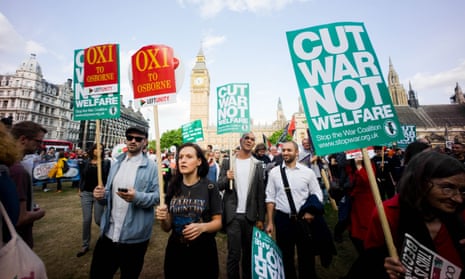George Osborne’s new “living wage” will fail to compensate low-income workers for the £12bn cuts in the welfare budget, some of which will leave tax credit claimants up to £1,000 a year worse off, according to the Institute for Fiscal Studies.
In its analysis of the chancellor’s budget, the IFS said the budget was regressive, taking “much more” from the poor than the rich. IFS director Paul Johnson said: “Unequivocally, tax credit recipients in work will be made worse off by the measures in the budget on average.”
The IFS said there were bound to be more losers than winners, as higher wages from the increase in the minimum wage would amount to £4bn in income, while the welfare changes will save the government £12bn.
The IFS said that 13m families would lose an average of £5 a week as a result of extending the freeze in working-age benefits, tax credits and the local housing allowance, until 2020.
Changes to Universal Credit, which affect the amount people can earn before benefits start to be withdrawn, will cost 3m families an average of £1,000 a year.
Johnson said: “Significant allowances were an integral part of the design of Universal Credit, intended to give claimants an incentive to move into work. This reform will cost about 3m families an average of £1,000 a year each. It will reduce the incentive for the first earner in the family to enter work.
“UC is the government’s flagship welfare reform, championed by the work and pensions minister, Iain Duncan-Smith, who enthusiastically welcomed the chancellor’s budget yesterday.”
The IFS said that, in total, the budget included £14bn in tax increases, only partly offset by £8bn in giveaways. Johnson said that the budget would lead to a “lower welfare country”, as the chancellor promised, but “was not quite consistent with the boast that it was aimed at a lower tax country”.
Johnson described Osborne’s decision to increase the minimum wage for over-25s to £9 an hour by 2020 as “a gamble”, saying that the only guaranteed way of securing higher wages was to boost productivity. He added: “We still await details of how that is to be tackled. Simply forcing wage increases by government fiat, by hiking the minimum wage, is more of a gamble.”
It was, he said, “a deeply disappointing budget for those of us who hoped the chancellor might take the chance to improve, simplify and reform our creaking tax system. This was not the budget of a tax-reforming chancellor.”
Impact of tax and benefit reforms between Jan 2010 and April 2019 (incl. universal credit): http://t.co/Gd3KOr1mA2 pic.twitter.com/LkDwX4SGzX
— IFS (@TheIFS) July 9, 2015
Given the array of benefit cuts, he said it was not surprising that “the changes overall are regressive – taking much more from poorer households than richer ones”.
He added: “Looking over the period of the consolidation as a whole, poorer households have done worse than those in the middle and upper-middle parts of the income distribution, though it remains the case that the some of the biggest losers have been those right at the very top of the income distribution.”
Andy Burnham, the Labour leadership contender, called the IFS verdict “devastating” and condemned the celebrations of Iain Duncan Smith, the work and pensions secretary, in the Commons on Wednesday. Burnham said in a tweet it showed the “nasty party was well and truly back”.
Read the devastating @TheIFS verdict on the Budget. Then look at this picture again. Nasty Party is well & truly back pic.twitter.com/f0c7Ysfp6t
— Andy Burnham (@andyburnhammp) July 9, 2015
Chris Leslie, the shadow chancellor said Labour was “delighted” that Osborne had “stolen” some of its manifesto policies – such as the increase in the minimum wage.
But he added: “Do not under-estimate how important those tax credits have been for many, many people who will be waking up this morning and I think left reeling by the massive reduction to their quality of life that will come because of the nature of this set of decisions. It will really hit working families hard.”

Comments (…)
Sign in or create your Guardian account to join the discussion